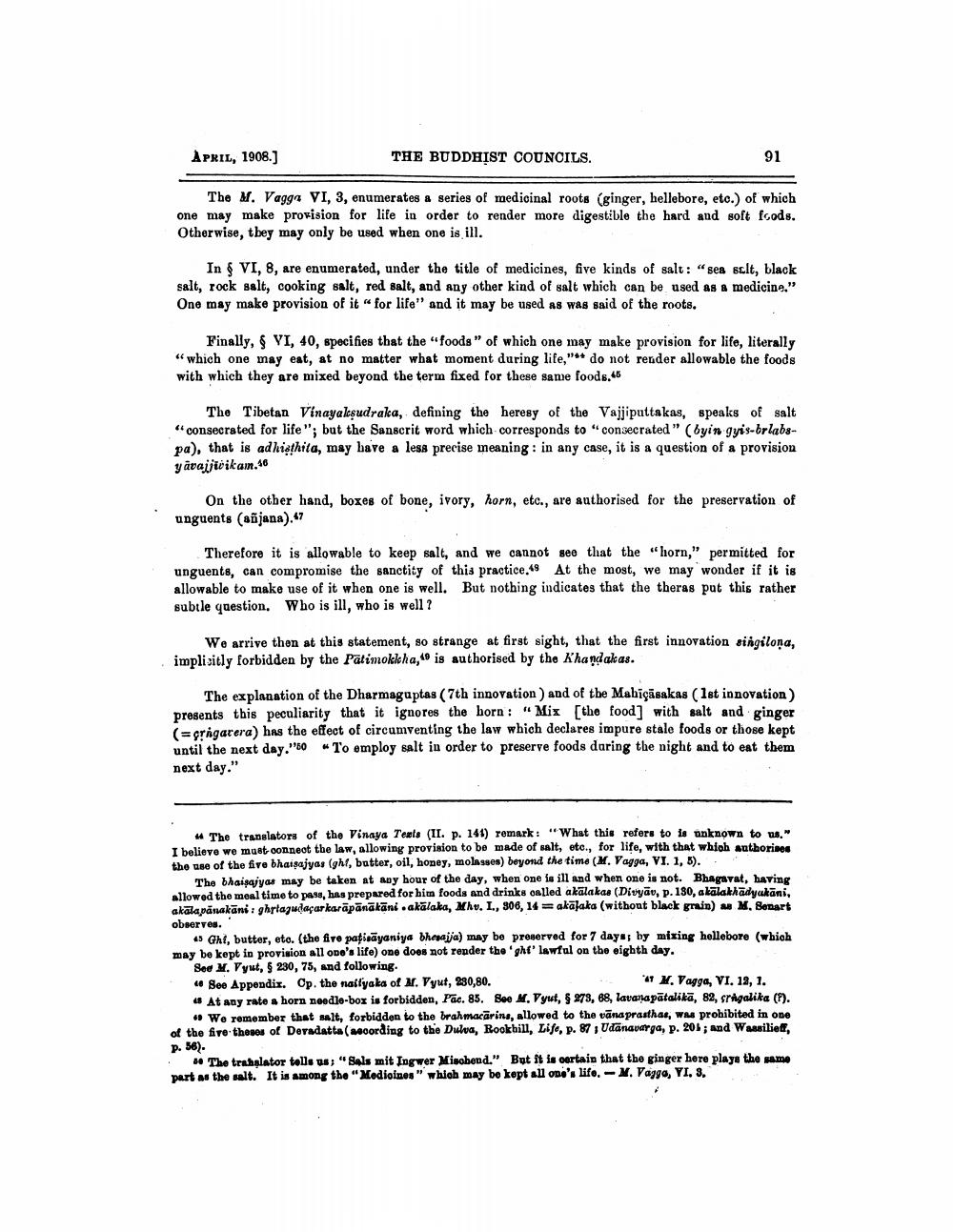________________
APRIL, 1908.)
THE BUDDHIST COUNCILS.
91
The M. Vaggu VI, 3, enumerates a series of medicinal roots (ginger, hellebore, etc.) of which one may make provision for life in order to render more digestible the hard and soft foods. Otherwise, they may only be used when one is ill.
In & VI, 8, are enumerated, under the title of medicines, five kinds of salt: "sea selt, black salt, rock salt, cooking salt, red salt, and any other kind of salt which can be used as a medicine." One may make provision of it " for life" and it may be used as was said of the roots.
Finally, VI, 40, specifies that the foods" of which one may make provision for life, literally “which one may eat, at no matter what moment during life," do not render allowable the foods with which they are mixed beyond the term fixed for these same foods.
The Tibetan Vinayaksudraka, defining the heresy of the Vajjiputtakas, speaks of salt “consecrated for life"; but the Sanscrit word which corresponds to "consecrated" (byin gyis-brlabspa), that is adhisthita, may have a less precise meaning: in any case, it is a question of a provision yavajjivikam.46
On the other hand, boxes of bone, ivory, horn, etc., are authorised for the preservation of unguents (añjana). 47
Therefore it is allowable to keep salt, and we cannot see that the “horn," permitted for unguents, can compromise the sanctity of this practice. At the most, we may wonder if it is allowable to make use of it when one is well. But nothing indicates that the theras put this rather subtle question. Who is ill, who is well ?
We arrive then at this statement, so strange at first sight, that the first innovation singilona, implisitly forbidden by the Patimokk ha, is authorised by the l'handakas.
The explanation of the Dharmaguptas (7th innovation and of the Mahigasakas (1st innovation ) presents this peculiarity that it ignores the horn: "Mix [the food] with salt and ginger (grigarera) has the effect of circumventing the law which declares impure stale foods or those kept until the next day."0" To employ salt in order to preserve foods during the night and to eat them next day."
The translators of the Vinaya Tewls (II. p. 141) remark: "What this refers to is unknown to us." I believe we must conneot the law, allowing provision to be made of salt, oto., for life, with that whloh authorines the use of the five bhaisajyas (ghr, batter, oil, honey, molasses) beyond the time (M. Vagga, VI. 1, 5).
The bhaingjyos may be taken at any hour of the day, when one is ill and when one is not. Bhagavat, having allowed the mealtime to pass, has prepared for him foods and drinks oalled akalakas (Divyāv, p. 180, a kalakhädykāni. akalapānakāni : ghalaqudacarkarāpānākāni.akālaka, Mhu. I., 806, 14 = akālaka (without black grain) m M. Bonart observes.
45 Ghe, butter, eto. (the five pațināyaniya bhavaija) may be preserved for 7 days by mixing hellebore (which may be kept in provision all ope's life) one does not render the ghe' lawful on the eighth day.
See M. Vyut, $ 230, 75, and following. " See Appendix. Op. the naityaka of M. Vyut, 280,80.
**X. Vagga, VI. 13, 1. 15 At any rate s horn needle-box is forbidden, Pac. 85. See M. Vyut, $ 273, 88, lavanapatalikā, 82, sragalika (F).
+ Wo remember that sult, forbidden to the brahmacārins, allowed to the vanaprasthas, was prohibited in one of the five theses of Devadatta (woording to the Dulva, Rookhill, Lifo, p. 87 Udänavarga, p. 205, and Wassilieff, p. 56).
The trahalator tells us, "Sals mit Ingwer Mischend." But it is certain that the ginger here plays the same part as the salt. It is among the "Modioines" which may be kept all ope's life.-M. Vagga, YI. 3.




